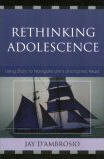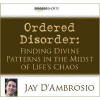Rethinking Bullying VIII
 Sword to the Eye
Sword to the EyeWhen Polyphemus was fast asleep, the wise Odysseus knew that the effects of the wine would soon wear off, and he and his men would again find themselves in mortal danger. Realizing this, the king knew that drastic measures needed to be taken. He heated his sword in the fire pit until the blade was red hot. Then, while his men restrained the Cyclops, Odysseus thrust the glowing blade deep into the epicenter of the monster’s hideous strength, his single eye. Blinded and in agony, the Cyclops rolled the enormous stone away from the mouth of the cave to call for help, allowing the Greek soldiers to escape.
The behavior of a bully can lead a victim to feel powerlessness. This feeling can have a deteriorating effect on the heart, leading to despair and hopelessness. The Old Testament story of David and Goliath describes the Philistine giant Goliath taunting the armies of Israel for days on end. The Israelite soldiers and even their king Saul felt more and more defeated and fearful the longer this was allowed to continue. Fear and despair, this is what we are fighting against. Encourage the victim to be assertive in bullying situations, just as the young David stepped in to face his huge opponent.
 What does assertiveness look like? It depends upon the student who is being bullied. If a student is being bullied in a school cafeteria every time he passes by a certain lunch table, he may be tempted to tiptoe quickly and quietly past the table while looking down at the ground so as to not draw unwanted attention. A protective response like this may seem natural, but over time it wears away a person’s sense of worth and serves to make the person feel even more powerless. It is a good exercise to identify one’s fears. An adult leader in circumstances such as these would want to help this student to identify his fears and put words to them.
What does assertiveness look like? It depends upon the student who is being bullied. If a student is being bullied in a school cafeteria every time he passes by a certain lunch table, he may be tempted to tiptoe quickly and quietly past the table while looking down at the ground so as to not draw unwanted attention. A protective response like this may seem natural, but over time it wears away a person’s sense of worth and serves to make the person feel even more powerless. It is a good exercise to identify one’s fears. An adult leader in circumstances such as these would want to help this student to identify his fears and put words to them.Keep in mind that this usually can only happen within the framework of a previously established relationship and sense of trust between adult and student. Putting words to our fears has the same effect as shining a light in a darkened room. It is a grounding technique, one that allows the student to take her fears from being something amorphous (which enables fears to last and linger far longer than they otherwise could) to something that is concrete and definable.
 Let’s say that this young lady walks meekly past a threatening situation because she is afraid that another student, or students, will say something disparaging toward her if she is noticed. In this case, assertiveness for her might be allowing herself to be noticed. She should speak up and walk proudly, with her head held high. She ought to make eye contact with those who have been harassing her. If a bully bothers her, she should loudly and firmly tell the person to stop what they are doing. Bullies rarely like to have their actions broadcast to everyone else. She may not feel that self-confident, but feelings follow actions.
Let’s say that this young lady walks meekly past a threatening situation because she is afraid that another student, or students, will say something disparaging toward her if she is noticed. In this case, assertiveness for her might be allowing herself to be noticed. She should speak up and walk proudly, with her head held high. She ought to make eye contact with those who have been harassing her. If a bully bothers her, she should loudly and firmly tell the person to stop what they are doing. Bullies rarely like to have their actions broadcast to everyone else. She may not feel that self-confident, but feelings follow actions. Metaphorically, the Cyclops cave represents a prison of fear, and the sword of Odysseus symbolizes assertiveness, which is the key to being released from the cave. For the Israelites, freedom from Goliath’s intimidation and fear came at the hands of a young boy armed with only a sling and a stone. In Tolkien’s The Hobbit, the people of Lake Town were liberated from the terror of the dragon Smaug through the courage of Bard and the swiftness of his Black Arrow. Act the way you want to feel until you actually feel that way. Don’t let the bullies win!
Metaphorically, the Cyclops cave represents a prison of fear, and the sword of Odysseus symbolizes assertiveness, which is the key to being released from the cave. For the Israelites, freedom from Goliath’s intimidation and fear came at the hands of a young boy armed with only a sling and a stone. In Tolkien’s The Hobbit, the people of Lake Town were liberated from the terror of the dragon Smaug through the courage of Bard and the swiftness of his Black Arrow. Act the way you want to feel until you actually feel that way. Don’t let the bullies win!This next assertion will probably ruffle some feathers, but some feathers need to be ruffled. There may be some circumstances where a young person may need to physically defend himself against a bully. This is especially true for adolescent boys. I think back to my tenth-grade boys’ gym class. Mr. Auberon, our teacher, introduced us to a number of different athletic activities such as baseball, basketball, archery, golf, tennis, and volleyball. One day he announced that he would be breaking the class up into pairs so that we could learn some wrestling moves. I remember some of the students in the class grumbling rather audibly when Mr. Auberon made the announcement, but even more I remember his reply to their protests. He said, “You never know what kind of situation you might find yourself in someday, and a man needs to know that he can take care of himself.” This is truer than many in our society want to believe. Like it or not, boys (and men) need to know that they are able to handle themselves if the going gets rough.
 Mr. Miyagi draws the truth out of his protégé Daniel LaRusso by asking, “Daniel-san, why do you study Karate?” Daniel replies, “So I can fight.” Miyagi looks deep into Daniel’s eyes and says, “Is that what you think?” “No,” Daniel replies, and then after a pause continues, “So I won’t have to fight!” Miyagi smiles.
Mr. Miyagi draws the truth out of his protégé Daniel LaRusso by asking, “Daniel-san, why do you study Karate?” Daniel replies, “So I can fight.” Miyagi looks deep into Daniel’s eyes and says, “Is that what you think?” “No,” Daniel replies, and then after a pause continues, “So I won’t have to fight!” Miyagi smiles.The battle is not in the physical realm. It is a contest for the heart. This suggestion is no doubt an investment of time and energy, but it is an investment that will pay lifelong dividends.
Labels: assertive, bully, bullying, cyclops, David, Goliath, Israelites, Odysseus, self-defense














